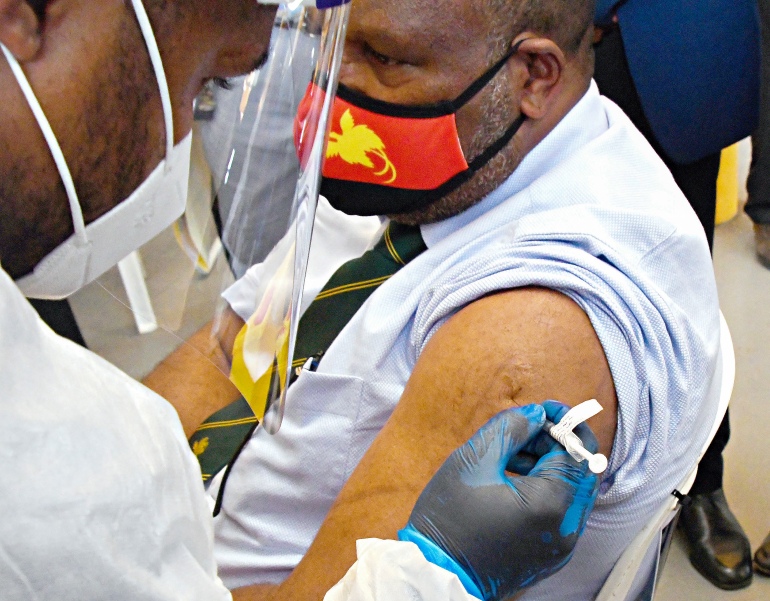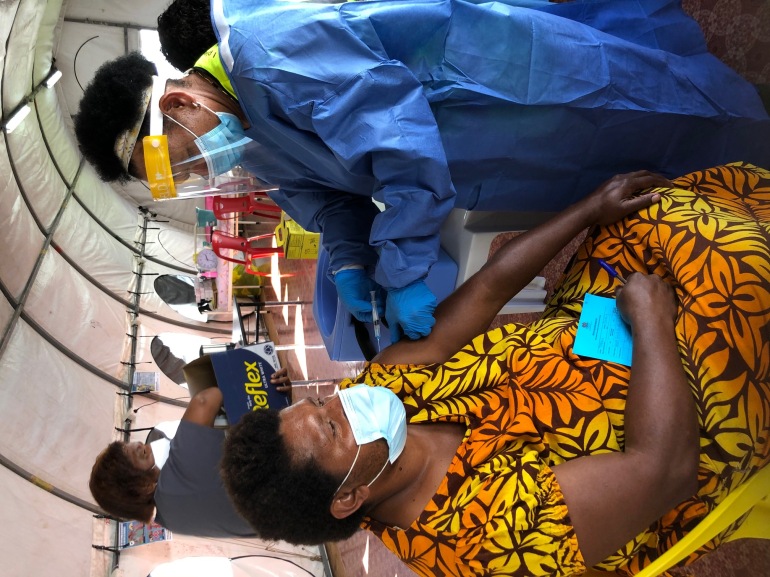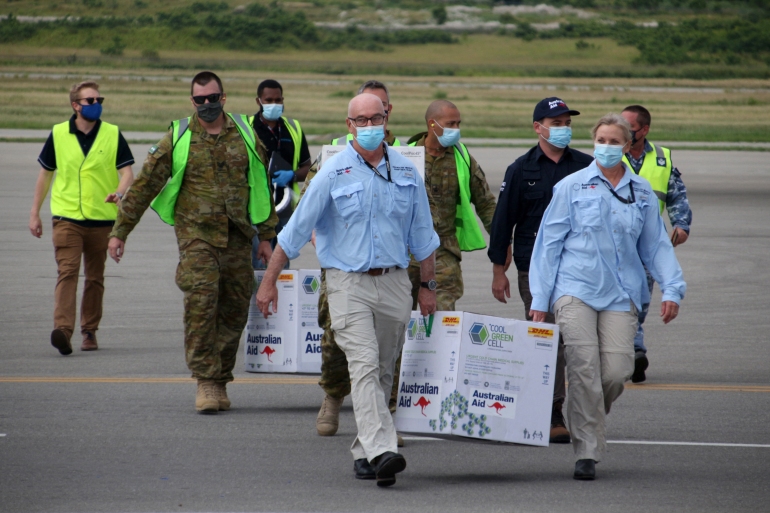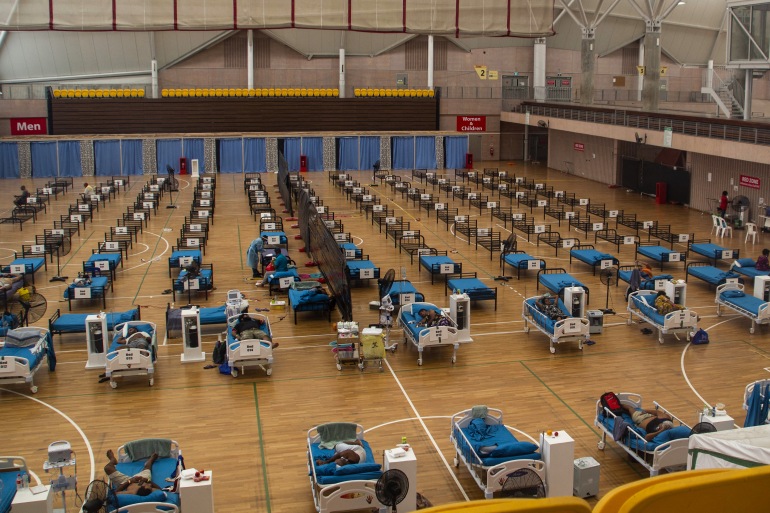PNG caught between COVID and vaccine sceptics in pandemic battle
International concerns are mounting as COVID-19 continues to sweep through unvaccinated Papua New Guinea (PNG) where, according to Our World in Data website, only 1.7 percent of its population has been fully vaccinated.
The vaccination rate remains abysmally low, despite adequate vaccine supplies and aid from the Australian government and international organisations such as the Red Cross.
The slow take up has been in part due to poor government messaging and the proliferation of misinformation on social media via mobile phones.
“There is a lot of misinformation around circulating largely from social media,” Jane Holden, Western Highlands Provincial Health Authority acting CEO, told Al Jazeera.
While inaccurate social media messaging about the COVID-19 vaccines has plagued nations worldwide – including Australia where there have been rallies against vaccines – Holden says that the key issue in Papua New Guinea is that there is a lack of access to factual media messaging.
“People do have access to social media more so than it would appear who can listen to the radio or read newspapers or see TV,” she said. “So, their phones are very important, and people are reading a lot of misinformation on their phones.”
Holden says that the misinformation is not necessarily just a belief in conspiracy theories, but a misunderstanding about how the vaccine works.
“People say ‘don’t get the vaccine because you can still get COVID, so what’s the point’.”
The diverse nation – home to more than 700 language groups – presents numerous challenges for health administrators; not only the mountainous terrain and lack of reliable transport routes but also low levels of formal education and existing health challenges, including HIV, tuberculosis and low life expectancy.
 Papua New Guinea’s Prime Minister James Marape received the AstraZeneca vaccine back in March, but many citizens, swayed by disinformation on social media, have yet to be convinced it is worth getting the jab [File: Gorethy Kenneth/AFP]
Papua New Guinea’s Prime Minister James Marape received the AstraZeneca vaccine back in March, but many citizens, swayed by disinformation on social media, have yet to be convinced it is worth getting the jab [File: Gorethy Kenneth/AFP]Holden told Al Jazeera that while the region her team operates in has decent roads “we do have some hard-to-reach places that we need to chopper teams into.
“Where we think we can go by road, we find sometimes we can’t get there so we have to organise people to ford rivers and then get another vehicle somehow from the other side and then just keep going on.”
“There are challenges in actually getting to villages or people living in villages, of course, getting to us.”
Building trust
In the small village of Kuntika, in the remote Western Highlands, community leader Eric Eribiang recently managed to oversee the vaccination of 72 people.
He agrees that the mixed messaging on social media has contributed to vaccine hesitancy.
“Now with social media, people have access to internet,” he told Al Jazeera.
“So, there is mixed feeling with people posting negative things about the vaccine. Actually, people are not getting the right message because of the propaganda.”
Such “propaganda” includes western social media messaging that the vaccine is a conspiracy to make people sick, along with anti-vaccine messaging propagated by some local church groups.
However, Eribiang says his status as the son of a chief and community leader was vital in communicating the importance of vaccinations.
“Being the chief’s son, I am able to have influence and talk and lead in the province,” he said.
Eribiang worked closely with the Western Highlands Health Service to administer the vaccinations in Kuntika, and the initiative has so far helped keep COVID-19 at bay in the remote community of fewer than 1,000 people. About half of them are under the age of 18 and not yet eligible for the jab under the country’s vaccine programme.
He argues that the key to building trust around vaccines and coronavirus education is having the right people tasked with the job.
“Building awareness and educating the public is an important role but at the same time you need to have the right people to do it,” he said.
“People who have influence in the society and people who could look up to them. It’s better than having another person from another place come and try to build awareness.”
 Western Highlands Health Service staff administer a COVID-19 vaccination in Mount Hagen [Courtesy of Jane Holden/WHHS]
Western Highlands Health Service staff administer a COVID-19 vaccination in Mount Hagen [Courtesy of Jane Holden/WHHS]Former Australian High Commissioner to Papua New Guinea, Ian Kemish, says that the issue is part of broader underinvestment in health services across the country of nine million people.
Despite being rich with resources, Human Rights Watch notes that 80 percent of the population lives in rural areas and 40 percent lives in poverty faced with challenges such as domestic violence, and tribal warfare. Traditional beliefs, including sorcery, remain deep-rooted.
The human rights group noted in April 2020 – the beginning of the pandemic – that the country had only 500 doctors, fewer than 4,000 nurses and only about 5,000 beds in hospitals and health centres.
“There has been underinvestment by the PNG government in the health system for a long time now,” Kemish said. “PNG is a country that’s seen some of the most rapid population growth since it received independence in 1975 so health services just haven’t kept up. So, the country is starting from behind already.”
Kemish adds that Papua New Guinea is following a trend seen worldwide, in which vaccine take-up is low in countries where government engagement, and trust in government, are low.
He says there is “a correlation between low vaccination rates on one hand and countries where either trust in government or engagement with government is pretty low on the other.”
Yet this low engagement is exacerbated in Papua New Guinea, where he said the government “is not very present in peoples’ lives.”
“People live remotely. And yet, Papua New Guineans do have access through smartphones to Facebook,” he said.
Kemish is also the chairman of the Kokoda Track Foundation, a Papua New Guinean-based charity.
The group recently worked with UN children’s agency UNICEF and Papua New Guinea Department of Health to deliver vaccines to the small mountainous village of Kokoda.
He says that the challenges of mountainous terrain and remote villages can be surmounted to deliver vaccinations, “but you’ve got to have people who are willing to be injected.
“It’s not jabs that are in short supply, it’s actually arms,” he said.
Facing fears
Vaccinations have been supplied under the COVAX programme and also through donations from countries such as Australia.
Medical aid has also been provided, with teams from the UK and Australia assisting Holden’s staff in Mount Hagen.
However, Holden is fearful that people will only come forward for the jab after an increase in COVID-19 deaths. PNG has reported 415 deaths from the disease but is battling a renewed surge in the virus that began last month.
“There is no doubt that people dying in villages appears to be a driver towards reducing vaccine hesitancy,” she said.
While the Papua New Guinea Ministry of Health did not respond to Al Jazeera’s requests for comment, its website contains information about COVID-19, the pandemic and vaccines.
 Australia has provided vaccine supplies to Papua New Guinea, its northern neighbour. The country is also receiving vaccines from the COVAX programme as well as China [File: Andrew Kutan/AFP]
Australia has provided vaccine supplies to Papua New Guinea, its northern neighbour. The country is also receiving vaccines from the COVAX programme as well as China [File: Andrew Kutan/AFP] Patients are treated at a makeshift COVID-19 hospital in Port Moresby, the capital of PNG, last month [File: Andrew Kutan/AFP]
Patients are treated at a makeshift COVID-19 hospital in Port Moresby, the capital of PNG, last month [File: Andrew Kutan/AFP]Holden and Eribiang say the information needs to be disseminated more widely not only via social media but also by people visiting remote areas.
“We need to make sure people know where to go to get the information they need,” said Holden.
“Each of us in the provinces need to be very, very focused on giving people clear messages out and being out in the villages so we can talk to people and talk to people about what fears they’ve got and try and bring the facts.”
Community leader Eribiang agrees that spreading the right message is key to avoiding a catastrophe.
“The awareness needs to go out clearly so people need to be aware of the facts surrounding COVID and the vaccine,” he said.
“When they get the true story, they will be able to decide for themselves whether to get the vaccine or not.”


